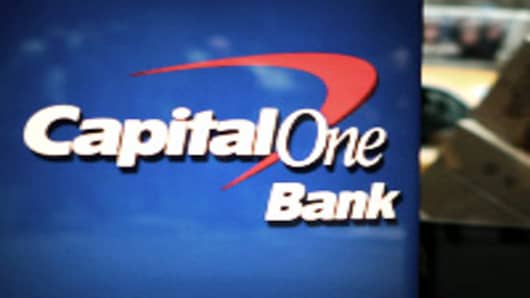The Office of the Comptroller of the Currency has reopened its public comment period for Capital One's pending deal to acquire HSBC's U.S. credit card portfolio for a premium of $2.6 billion.
Capital One still expects the ING deal to be completed late this year or early in 2012, providing needed liquidity for the HSBC card deal, which is expected to close in the second quarter.
Shares of Capital One closed at $45.15 Monday, rising 7 percent year-to-date, which is a strong return in a year that has seen the KBW Bank Index pull back 27 percent. And the shares trade at valuations similar to the "big four" U.S. bank holding companies, while Capital One has posted much stronger earnings results.
The better earnings for Capital One are no surprise, with credit cards providing 65 percent of third-quarter revenue and 70 percent of earnings from continued operations, after tax. Capital One's operating return on average assets was 1.72 percent in the third quarter according to SNL Financial, and has ranged between 1.42 percent and 2.08 percent over the past five quarters.
The shares trade for just 7.5 times the consensus 2012 earnings estimate of $6.14 a share, among analysts polled by FactSet, and for 1.4 times tangible book value, according to SNL.
Let's see how these numbers stack up against the big four U.S. bank holding companies:
- Shares of Bank of America closed at $5.45 Monday, down 59 percent year-to-date. The shares trade for 5.8 times the consensus 2012 EPS estimate of 99 cents and for 0.4 times tangible book value. The ROA over the past five quarters has ranged from a negative 1.51 percent in the second quarter, when the company posted a net loss of $9.1 billion, springing from a $14.5 billion loss in its Consumer Real Estate division as it tried to put mortgage putback demands behind it, to a positive ROA of 1.08 percent in the third quarter.
- JPMorgan Chase closed at $32.04 Monday, down 23 percent year to date. The shares trade for 6.8 times the consensus 2012 EPS estimate of $4.88, and just under tangible book value. The ROA over the past five quarters has ranged between 0.76 percent and 1.06 percent.
- Shares of Wells Fargo , closed at $26.29 Monday, down 14 percent year-to-date. The shares trade for 8.4 times the consensus 2012 EPS estimate of $3.20 and 1.5 times tangible book value. The ROA has ranged between 1.12 percent and 1.29 percent over the past five quarters.
- Citigroup closed at $27.22 Monday, down 42 percent year-to-date. The shares trade for 6.6 times the consensus 2012 EPS estimate of $4.34, and for just over half their tangible book value. The ROA has ranged between 0.28 percent and 0.76 percent over the past five quarters.
You get what you pay for, and Capital One is putting up consistent earnings numbers.
Looking back to the five full years before the credit crisis nearly wiped-out the company's earnings in 2008, Capital One's ROA ranged from 1.74 percent to 3.05 percent, and the shares tended to trade in a range of 14 to 27 times trailing earnings.
The most important factor in Capital One's strong performance this year, with two large mergers pending, not to mention regulatory challenges to earnings for all large banks, the enhanced Basel III capital requirements, and a third round of Federal Reserve stress tests looming, is the company's outstanding earnings performance.
Capital One's renewed commitment to its core competency in credit card lending portends continued earnings improvement as the company integrates its two acquisitions over the next year.
And that should continue to propel the shares forward.
Additional News: High Costs of the Volcker Rule
Additional Views: Time to Bet on Financials?
Disclosures:
TheStreet's editorial policy prohibits staff editors, reporters and analysts from holding positions in any individual stocks.
Disclaimer
______________________________
CNBC Data Pages:


